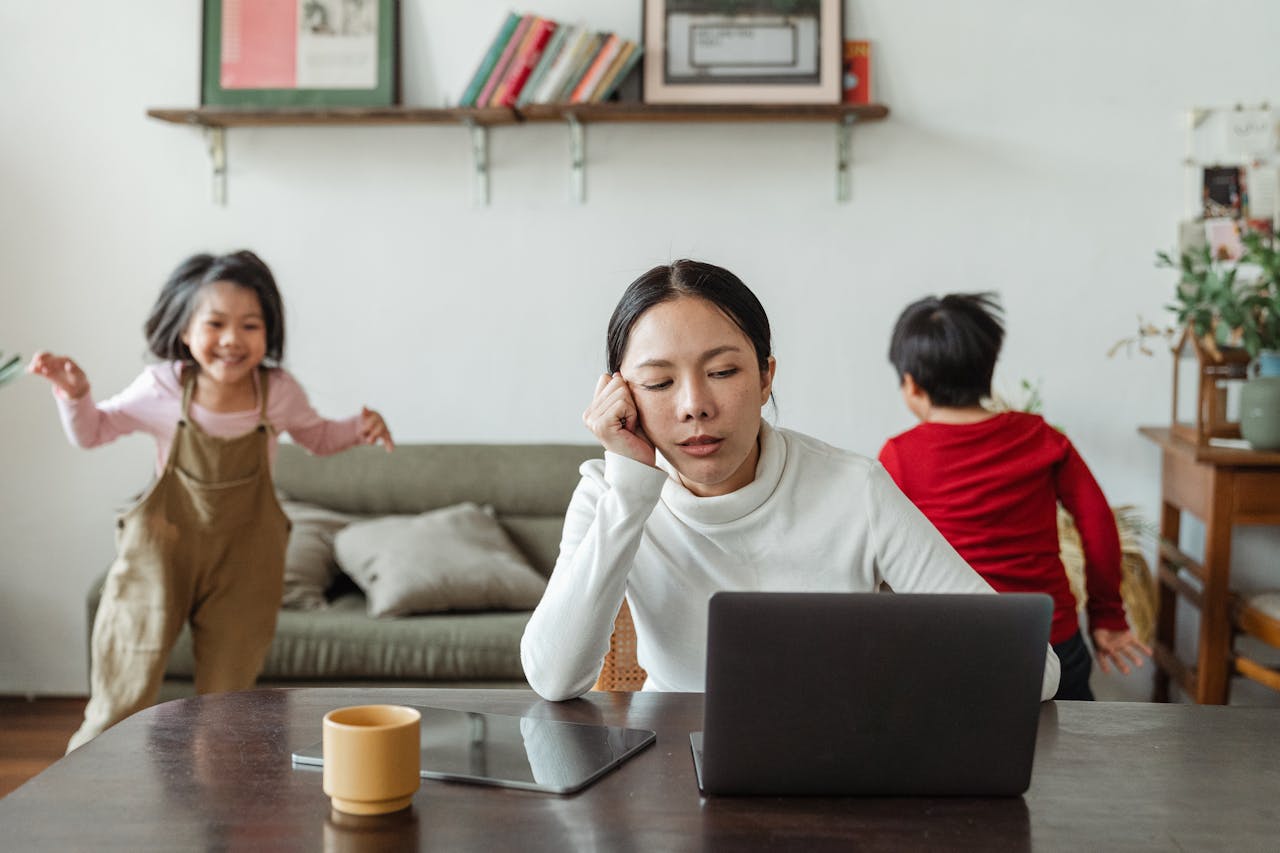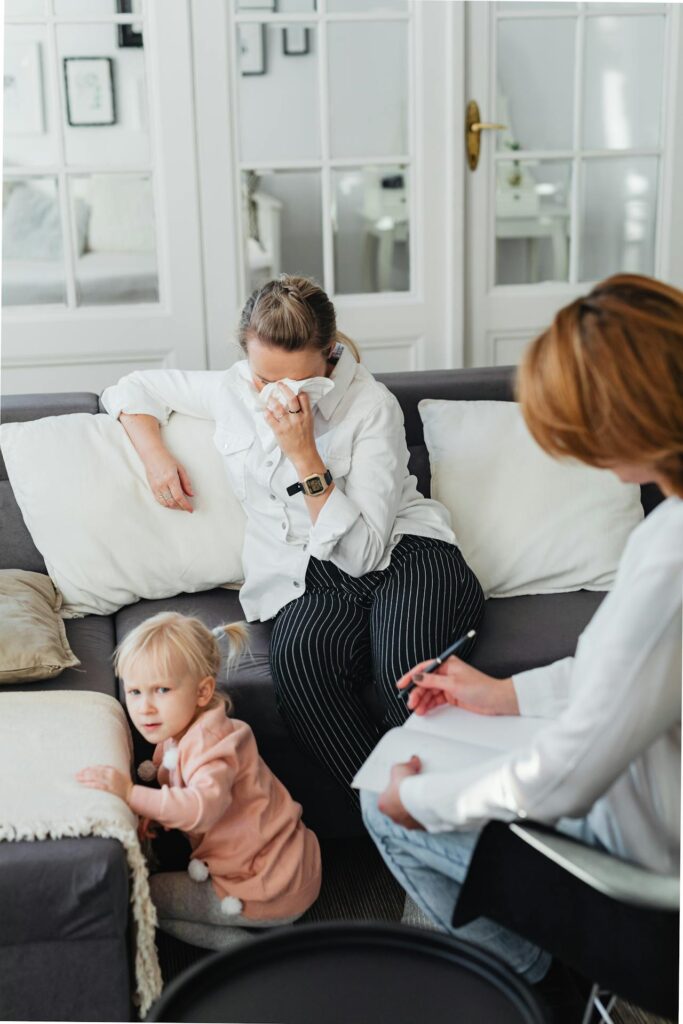
Body + Mind is reader-supported. We may earn an affiliate commission when you buy through some of the links on our site.
Anxiety often passes from one generation to the next, even without words. Children sense their caregivers’ moods and often internalize them. In homes where anxiety lingers, kids can grow up feeling overwhelmed, even before they understand what anxiety means. This cycle affects how children develop emotionally, physically and socially. Breaking it starts with awareness, support and deliberate change.

A child’s early environment is critical in brain development and well-being. How a parent reacts to stress, expresses emotion and connects with their child shapes the child’s emotional, neurological and social growth. In this sense, supportive parenting builds trust and resilience, while inconsistent or anxious caregiving can leave children feeling unsafe or emotionally confused.
Parental traits — such as mental health and life stress — greatly influence parenting behaviors. Parents who experience social anxiety tend to exhibit less warmth and might perceive their child’s behavior in a more negative light. This can result in them correcting their child due to a fear of judgment. Similarly, parents dealing with generalized anxiety may find it challenging to manage their emotions, resulting in responses that are inconsistent or unsuitable.
It’s normal for children to worry. But persistent or intense fears may indicate anxiety. This disorder can take many forms. For instance, separation anxiety disorder involves a strong fear of being away from parents. When it comes to social anxiety disorder, it leads to a fear of being around people or in public places. Generalized anxiety disorder means ongoing worry that is not tied to one specific event.
Additionally, anxiety can physically manifest in many ways, leading to symptoms such as stomachaches, headaches and fatigue. If you suspect your child is experiencing anxiety, the first step is to seek a professional evaluation. A proper diagnosis helps families understand what’s happening and opens the door to effective treatment.

These strategies provide practical steps you can take to reduce anxiety within your family and begin breaking the intergenerational cycle.
Mindfulness is about focusing on the present moment and experiencing it without allowing your judgment to interfere. When it comes to mindful parenting, it means staying present while listening fully and responding with empathy. In fact, parents with high dispositional mindfulness manage emotions better, resulting in stronger relationships and less stress, anxiety and depression.
This approach also builds self-awareness and connection. It reduces reactivity and supports calmer parent–child dynamics. Consider mindful parenting interventions to receive help and support from experts who can offer guidance. For instance, it can strengthen these skills and improve family well-being.
Anxiety disorders often begin early. Yet many parents are unsure when worry becomes a clinical issue. Some feel confused by the diagnostic process, and others struggle with stigma or fear of labeling their child. Still, receiving a diagnosis can offer clarity, reduce blame and help the family access support.
With a diagnosis, psychological interventions can successfully address child anxiety disorders, which might affect how parents view their child’s anxiety disorder diagnosis. Additionally, sharing that anxiety is common and treatable also eases fears about the future. When clinicians take time to explain diagnoses clearly and compassionately, families feel more empowered and less overwhelmed.
Avoiding communication can heighten children’s anxiety, causing them to develop incorrect and damaging beliefs about themselves and to engage in problematic behaviors. Some possible outcomes are risky health behaviors and aggression. Warm, responsive and open communication helps parents address sensitive health issues effectively. This kind of interaction supports better child health and well-being.
Additionally, you can enhance communication with schools by getting involved with your child’s education. If your child struggles with anxiety, help teachers understand the cause. For example, explain that defiance or silence may come from anxiety rather than disobedience. Work together to provide the support your child needs.
Watch for stress at home, in school or in social situations. Recognizing these triggers can help manage early signs of anxiety. Once you have it, try building simple routines that support well-being, like eating meals together and keeping consistent sleep schedules. Or propose reducing screen time and cutting back on caffeine.
Try calming activities like yoga, which uses breathing techniques to ease anxiety, stress and depression. Tools like relaxation apps or a mood diary to track and understand your emotions can also help. When anxiety arises, try techniques to manage stress. You can slow your speech, take time to calm down, respect others’ feelings and respond with assertiveness instead of aggression.

Support your child’s growing independence by encouraging them to express opinions and make decisions. Recognize their decision-making and problem-solving skills and celebrate their efforts. This kind of support helps children feel capable and in control, which can ease anxious thoughts.
When your child faces a challenge, help them manage anxiety by breaking the task into smaller, achievable steps. Offer encouragement after each step to create a sense of progress and reduce fear. Be sure to acknowledge brave, helpful or kind behavior right away. For younger children, it’s important to recognize even small acts of courage — ideally every day — as these moments lay the foundation for long-term resilience.
Coping includes the thoughts, feelings and actions used to handle daily stress. Some strategies — like problem-solving — are helpful. Others — like constant worrying — are not. These can appear together, but the goal is to use the helpful ones more often. Teaching children to rely on positive coping tools strengthens their emotional growth and learning.
Parents and teachers are very important in this process. When adults use clear, consistent language about coping, children are more likely to understand and practice those skills. Positive thinking also helps manage stress. In contrast, poor coping habits can increase anxiety. By promoting a hopeful mindset, you help children face challenges with less fear and more resilience.
How does a parent with anxiety affect their child? Parental anxiety can shape how children develop and cope with emotions. Noticing the signs in yourself and your child allows for early support. Families can grow stronger together through mindful parenting, open communication and healthy coping strategies. Self-care and encouraging independence help reinforce this cycle. With awareness and small, steady steps, you can break patterns of anxiety and build a healthier future.
Your email address will only be used to send you our newsletter, and at any time you may unsubscribe. For more information, see our Privacy Policy.